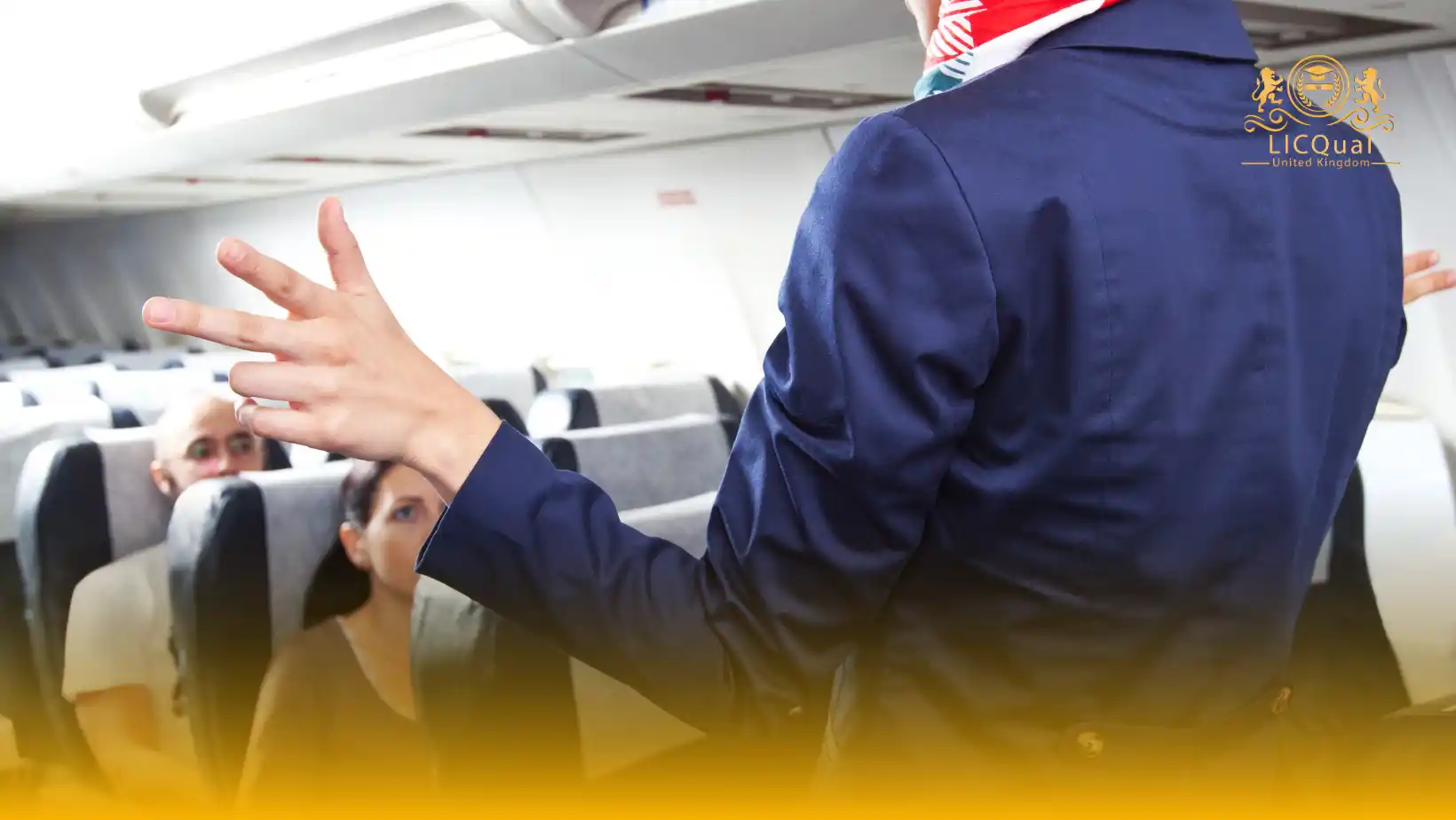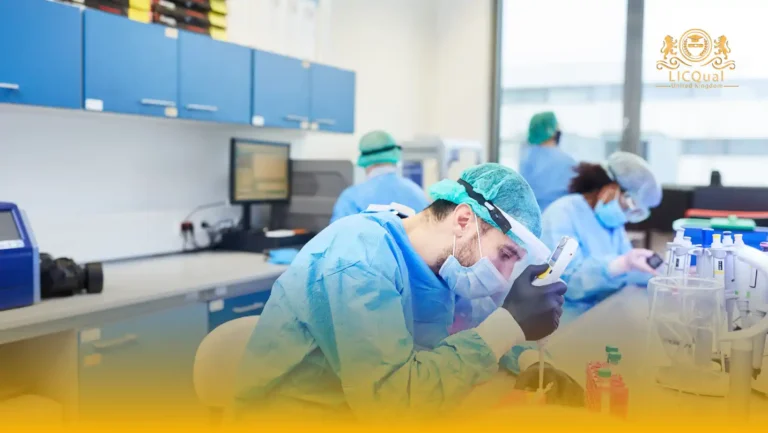The LICQual UK Level 6 Diploma in Airline Safety is a globally recognized qualification designed for aviation professionals who want to strengthen their expertise in airline safety, risk management, and aviation operations. Accredited in the UK, this Level 6 Diploma in Airline Safety provides both the theoretical knowledge and practical skills needed to meet international aviation safety standards and prepare for senior roles across the airline industry.
In today’s aviation sector, safety is not just a regulatory requirement—it is the foundation of trust, compliance, and operational excellence. This UK-accredited Airline Safety Diploma equips learners with advanced insights into aviation safety management systems, airline operations, and risk assessment strategies. Whether you are already working in aviation or planning to enter the field, this program ensures you gain the competencies that employers worldwide value most.
The LICQual UK Diploma in Airline Safety stands out for its balance of academic depth and real-world application. Learners explore essential areas such as aviation safety and risk management, airline safety and security, and international aviation regulations. By completing this Airline Safety Diploma Level 6 qualification, you position yourself for career growth in roles such as safety manager, compliance officer, or aviation operations specialist.
This program is also ideal for professionals seeking an internationally accredited airline safety qualification that aligns with global aviation standards. With flexible study options and a curriculum designed by industry experts, the diploma supports both career advancement and lifelong learning.
If you are ready to boost your aviation career with a globally recognized UK qualification, the LICQual UK Level 6 Diploma in Airline Safety is your pathway to success. Gain the expertise, credibility, and confidence to lead in one of the most critical areas of the aviation industry—airline safety.
Course Overview
Qualification Title
LICQual UK Level 6 Diploma in Airline Safety
Total Units
6
Total Credits
120
GLH
480
Qualification #
LICQ2201252
Qualification Specification
To enroll in the LICQual UK Level 6 Diploma in Airline Safety, applicants must meet the following criteria:
|
Qualification# |
Unit Title |
Credits |
GLH |
|---|---|---|---|
|
LICQ2201252-1 |
Strategic Airline Safety Management and Operational Planning |
20 |
80 |
|
LICQ2201252-2 |
International Aviation Law, Global Policy, and Regulatory Compliance |
20 |
80 |
|
LICQ2201252-3 |
Advanced Airline Safety Systems and Risk Management |
20 |
80 |
|
LICQ2201252-4 |
Aviation Finance, Safety Investment Strategies, and Resource Optimization |
20 |
80 |
|
LICQ2201252-5 |
Leadership, Human Resource Development, and Safety Culture in Airline Operations |
20 |
80 |
|
LICQ2201252-6 |
Innovation, Emerging Technologies, and Sustainable Practices in Airline Safety Management |
20 |
80 |
By the end of this course, learners will be able to:
1. Strategic Airline Safety Management and Operational Planning
By the end of this unit, learners will be able to:
- Apply advanced principles of airline safety management to strategic and operational planning.
- Evaluate airline scheduling, route planning, and operational efficiency with a focus on safety outcomes.
- Integrate safety performance indicators into organizational decision-making and resource allocation.
- Develop comprehensive safety management frameworks aligned with ICAO and international standards.
- Critically assess operational risks and propose mitigation strategies for complex airline environments.
- Design strategic safety plans that balance regulatory compliance, cost efficiency, and passenger safety.
2. International Aviation Law, Global Policy, and Regulatory Compliance
By the end of this unit, learners will be able to:
- Interpret and apply international aviation law, treaties, and conventions to airline operations.
- Analyze global aviation policies and their impact on airline safety and compliance frameworks.
- Evaluate regulatory requirements from ICAO, EASA, FAA, and other authorities in a global context.
- Assess the implications of bilateral and multilateral agreements on airline safety and operations.
- Formulate compliance strategies that align with international aviation law and corporate governance.
- Demonstrate awareness of ethical, cultural, and sustainability considerations in global aviation policy.
3. Advanced Airline Safety Systems and Risk Management
By the end of this unit, learners will be able to:
- Implement advanced safety management systems (SMS) within airline operations.
- Conduct comprehensive risk assessments using quantitative and qualitative methodologies.
- Analyze safety data to identify trends, hazards, and systemic vulnerabilities.
- Apply predictive risk management tools to prevent incidents and enhance operational resilience.
- Integrate safety systems with quality, security, and compliance frameworks for holistic management.
- Evaluate the effectiveness of safety audits, investigations, and continuous improvement processes.
4. Aviation Finance, Safety Investment Strategies, and Resource Optimization
By the end of this unit, learners will be able to:
- Analyze aviation finance principles and their role in sustaining airline safety initiatives.
- Evaluate cost–benefit models for safety investments and resource allocation.
- Develop financial strategies that balance profitability with safety and compliance obligations.
- Assess the impact of global economic trends on aviation safety funding and risk management.
- Formulate investment strategies for safety technologies, training, and infrastructure.
- Optimize resource utilization to achieve sustainable safety performance in airline operations.
5. Leadership, Human Resource Development, and Safety Culture in Airline Operations
By the end of this unit, learners will be able to:
- Demonstrate leadership strategies that foster a strong airline safety culture.
- Evaluate the role of human factors and crew resource management in aviation safety.
- Design HR development programs that enhance safety awareness and professional competence.
- Apply organizational psychology principles to improve safety communication and decision-making.
- Assess the impact of leadership styles on safety performance and employee engagement.
- Promote continuous improvement and accountability within airline safety teams.
6. Innovation, Emerging Technologies, and Sustainable Practices in Airline Safety Management
By the end of this unit, learners will be able to:
- Evaluate the role of emerging technologies such as AI, big data, and automation in airline safety.
- Assess the impact of digital transformation on safety monitoring, reporting, and compliance.
- Integrate sustainable practices into safety management systems to meet global environmental goals.
- Analyze case studies of innovative safety solutions in aviation and their measurable outcomes.
- Formulate strategies for adopting new technologies while managing associated risks.
- Demonstrate critical awareness of future trends shaping global airline safety management.
The LICQual UK Level 6 Diploma in Airline Safety is designed for aviation professionals, aspiring leaders, and individuals seeking internationally recognized qualifications in airline safety and risk management. This UK‑accredited Airline Safety Diploma is ideal for those who want to strengthen their expertise, advance into senior roles, and align with global aviation safety standards. Whether you are already working in the industry or planning to enter, this program provides the knowledge, credibility, and career progression you need.
1. Aviation Safety Professionals
- Individuals working in airline safety departments seeking advanced qualifications.
- Safety officers aiming to enhance their knowledge of international aviation safety standards.
- Professionals responsible for implementing Safety Management Systems (SMS).
- Those preparing for senior safety management or compliance roles.
- Practitioners looking to align with ICAO, EASA, and FAA safety frameworks.
2. Airline Operations and Compliance Managers
- Managers overseeing daily airline operations with a focus on safety and efficiency.
- Compliance officers ensuring adherence to international aviation regulations.
- Professionals tasked with integrating safety into operational planning.
- Leaders responsible for risk assessment and mitigation strategies.
- Individuals aiming to strengthen organizational safety culture.
3. Aviation Engineers and Technical Specialists
- Engineers involved in aircraft maintenance and safety inspections.
- Technical staff seeking to understand advanced safety systems and risk management.
- Professionals working with emerging aviation technologies and safety innovations.
- Specialists aiming to integrate safety into engineering and technical operations.
- Those preparing for leadership roles in aviation engineering safety.
4. Aspiring Aviation Leaders and Managers
- Early‑career professionals aiming to move into leadership positions.
- Individuals seeking internationally accredited airline safety qualifications.
- Future managers preparing for roles in safety, compliance, or operations.
- Learners who want to combine leadership skills with aviation safety expertise.
- Professionals looking to build credibility for global career opportunities.
5. Government, Policy, and Regulatory Personnel
- Aviation regulators and inspectors responsible for enforcing safety standards.
- Policy makers involved in drafting or implementing aviation safety regulations.
- Government officials working with international aviation organizations.
- Professionals ensuring compliance with ICAO, EASA, and FAA frameworks.
- Individuals seeking deeper knowledge of global aviation law and policy.
6. Aviation Finance and Resource Managers
- Finance professionals managing budgets for safety investments.
- Resource planners optimizing safety training and infrastructure costs.
- Managers balancing profitability with safety compliance obligations.
- Professionals evaluating cost–benefit models for safety initiatives.
- Individuals preparing for strategic roles in aviation finance and safety.
7. International Students and Career Changers
- Learners from non‑aviation backgrounds seeking entry into the aviation industry.
- International students aiming for a UK‑accredited airline safety diploma.
- Professionals transitioning from related fields such as logistics or transportation.
- Career changers looking for globally recognized qualifications in aviation safety.
- Individuals motivated to pursue long‑term careers in airline safety and operations.
Assessment and Verification
All units within this qualification are subject to internal assessment by the approved centre and external verification by LICQual. The qualification follows a criterion-referenced assessment approach, ensuring that learners meet all specified learning outcomes.
To achieve a ‘Pass’ in any unit, learners must provide valid, sufficient, and authentic evidence demonstrating their attainment of all learning outcomes and compliance with the prescribed assessment criteria. The Assessor is responsible for evaluating the evidence and determining whether the learner has successfully met the required standards.
Assessors must maintain a clear and comprehensive audit trail, documenting the basis for their assessment decisions to ensure transparency, consistency, and compliance with quality assurance requirements.







